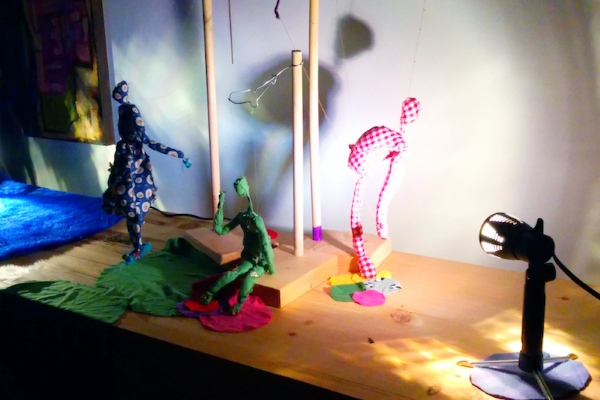Puppets as a tool for transformation
October 2, 2014
Share
Lisa Figge was working in the military when she first noticed that her boots were feeling unusually heavy.
“Going up stairs got hard. Fueling airplanes got hard,” she recalls. “I thought it was because I had just had a baby and was tired.”

Instead, Ms. Figge was diagnosed with multiple sclerosis (MS), a degenerative disease that affects the central nervous system.
Eighteen years after that diagnosis, Ms. Figge, a PhD candidate in the Cultural Studies program, is exploring her own disability in an exhibit at the Isabel Bader Centre for the Performing Arts. She says the hand-stitched puppets on strings and 29-minute loop of video work that make up Lisa Figge Project Work: Need to be Adored are part of a larger, autoethnographic project that has allowed her to put herself at the heart of her research.
“I am exploring my specific experience of disability as my PhD research project,” says Figge, who now uses a mobility scooter to get around since losing the use of her legs. “And because I am an artist, that has turned out –to my surprise – to be puppets as well as very personal-feeling experimental films.”
It was Figge’s diagnosis that first drew her to Queen’s as a mature student in 2003, where she started with a single undergraduate course in English literature.
“It was the only thing I could do,” she says simply. “I couldn’t work, but I could sit for three hours in a lecture.”
By the time she started her Master’s degree in Environmental Studies in 2008, Ms. Figge was using a cane to get around, eventually relying on a walker for support. By 2010, when she started her PhD, she was unable to cross campus without the scooter.
“After my Master’s degree I had wanted to do more environmental work,” says Ms. Figge, “but I realized that I had an able bodied aesthetic that was impossible for me to participate in. It felt cruel, but it led me into disability studies, which is a vital and blossoming area of research in the humanities.”
Ms. Figge says that her puppets are not only providing her with a way of accessing her past, they are also giving her a voice.
“My education has turned me into a performance artist who is also a painter and a sculptor and a sewer. I had wanted to make big things, but I couldn’t manage it,” she says simply. “I make things that I can make now. I had to find a new relationship with materials that could express this alternative mobility that I now have. The puppets have helped me to do that.”
Ms. Figge is particularly thrilled that her exhibit will be among the first to be held in the Isabel’s Media Lab, a building she loves for its many accessible features.
“I love the elevator, I love the ramp all the way down to the water, and the accessible bathrooms,” she says. “The entrance ramp is magnificent, and they also have a whole bunch of disability parking spots out front. I want us to make the Isabel the most accessible space in Kingston.”
Lisa Figge Project Work: Need to be Adored runs until October 8 in the Media Lab (Room 124) at the Isabel Bader Centre for the Performing Arts. The exhibition is open from 11am - 4pm, Monday through Friday.